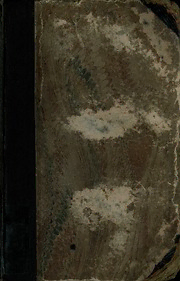
A dictionary of the principal languages spoken in the Bengal presidency, viz. English, Bángálí, and Hindústání. In the roman character; PDF
Preview A dictionary of the principal languages spoken in the Bengal presidency, viz. English, Bángálí, and Hindústání. In the roman character;
^ y ¥. ^A GIFT OF V 7^^-7^ y^r/^r^^^^^zn i 7*? >^^ V z... GIFT OF \ K 7^^-7^ /^r^/^ar^^sO^^jCiA ^? '^^.. DICTIONARY OP THE PKINCIPAL LANGUAGES SPOKEN IN THE BENGAL PRESIDENCY, VIZ. English, Bangali, and Hindustani. IN THE ROMAN CHARACTER; WITH WALKER'S PRONUNCIATION OF ALL THE DIP- FICULT OR DOUBTFUL ENGLISH WORDS. CALCUTTA: Printed by G. Woollaston, Commercial Press, 9, Cossitollah. 1837. t R E F A C fi. D ; In order to convey a correctidea of the nature of thiswork, itis neces- saryto explain the motives which led to itsbeingundertaken. The English language has for some time past begun tobe appreciatedas itdeserves to be, by the Natives of India. It is rapidly becoming the language of liberal education. It is cultivated in the numerous Seminaries which have been established at the principal stations of the Bengal and Agra Presidencies, and the persons are not few who study it at theirown homes independently of any Seminary. At this turn of the national taste, the essential aidwhich a Dictionary affords in the acquisition of a new language was almost entirely wanting. Those whicli were procurable had been prepared for the use, not of the Na- tive, but of the European student. Theirexcessivecostplacedthembeyond the reach of any except the mostwealthy, and the interpretation given by them in the Native language was generally confined to the nearestcorres- pondingword, Avithoutany detailed explanation. Under these circumstances, it appeared to mo that I could notconfera greater benefiton my countrymenthanbygivingtheman English Dictionary intended expressly forthemselves. It hasbten made cheap in order that it may be accessible to all wholearn English. The explanationsin the Native languages of the English wordshave been prepared in the manner bestcal- culated to render European ideas intelligible to a Native of India; and in order that the work may be equally useful in every part of India in which thp Bangali or Hindustanilanguage isspoken, the Native part ofithasbeen rendered complete in both those languages. But although primarily intended fortheuseofthe Natives, thisDictionary will not be withoutits advantage to Europeans. Even to them itsupplies a place which is not exactly occupied by any existingwork. Itexplains,both in Bangaliand Hindustani, tlievarioustermsconnectedwith Europeanlitera- ture, science, religion, civil and military affairs, &c. &c. in some detail, and inamannersuitedtoNativeassociationsand habits ofthinking; anditthere- fore cannotfail to be an useful manual to every European who has frequent intercourse with the Natives. It will be proper to add a few words on the mode in which the work has been prepared. I undertook the compilation in the hope of finding-^11 the necessary materials in the existing Lexicons. I accordinglyobtainedallthe Bangali and Hindustani Dictionaries procurable; but after I had com- menced upon the work, I soon discovered that I was farfromhaving all the materialsrequiredtocompletemyintendedpublication. Intheletter.a alone I foundthatthere were about650 wordsmore in mytextthan IcouldfindIn " IV any existing HindfistSni Dictionary.* In this dilemma I sought the assist- ance ofcompetentindividuals. Inthe Hindustani partofthework, Maulavi Zainuddin Hussain and several other Gentlemen gaveme theirready aid. In the BAngdli, the materials 1 had colUcted werenotinsufficient,but as the plan of my Work was different from that of the existingimblications, I ob- tained the valuable assistance of the Rev. W. Morton, and my friend Babii TAra Chdnd Chakrabati. In carrying the work through the Press I have been assisted throughout by Bdbu Shydni/icharan Sarkar. My text book was Corrall's edition of Johnson's Dictionary, but I have added many useful, and omitted many obsolete and uncommon Mords and ; when the delinitions appeared not to be sufficiently comprehensive, I availed myself of the assistance of Todd's Johnson and Smart's Walker's Dictionaries to improve them. As I did all this after the sheets had passed through the handsofthe Gentlemen abovementioned, I am alone responsible for the imperfections of the work. P. S. D'ROZARIO. • Manjof these are words not in common use, but others, of which the following — areinstances, areindailyuse: Acerbity, Aeronaut, Afliliation, Affusion, Aisle, Altera- tive, Ambient, Ambit, Anglicism, Antemeridian, Arcade, Arcauura, Atlantic, Attic, Autocrat,&c. &c. ABBREVIATIONS. IN ENGLISH. a. for .... Adjective. * Substantive. ad Adverb. spl Substantive Plural. c Conjunction. pro Pronoun. int Interjection. V Verb. pa Participle. va Verb Active. pr I^reposition. vn Verb Neuter. IN BA'NGA'Ll' d» for .... deo7i. kr. hrita. h haon. l. ... Iaon. J. ..»•••••«. jaoii. r, • raklian. k karan* tN HINDU'STA^M'. b, w. for bandnewalaor wali, k. d kardend. dd.. w.. ddeennae.waU orwali. k- Ji kkiiyyaaghauyaa;. 1^' S" li. . bona. •^- ^^ kanie walaor wa!i. h. j hojiina. 1' rnkhna, h. w hone wala or wali. r- ^v rakhne wala or waii J}. w j.jaannea.wala orwali. !1• w lleenn^e.w^la or wali. k. ..^ karud- w. g waghaira.
